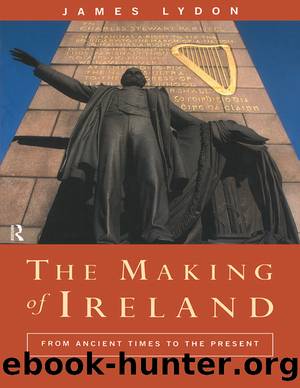The Making of Ireland by James Lydon

Author:James Lydon [Lydon, James]
Language: eng
Format: epub
Tags: History, General
ISBN: 9781134981519
Google: 6YwrBgAAQBAJ
Publisher: Routledge
Published: 2012-08-06T01:16:24+00:00
10Protestant Nationalism and the Anglican Ascendancy
On 23 October 1692, assembled in St Andrewâs church in Dublin, the Irish House of Commons listened to a sermon preached by their chaplain, Dr Edward Walkington. He reminded his listeners that they had âall the blessings of other governments, without any of their mischiefsâ. In particular, he boasted of âthe authority of our representatives in parliament securing us from the encroachments of an arbitrary prerogative, which makes our laws, our liberties, our estates and our religion too, our ownâ. These, he said, were âso fully our own, that they canât be touched, but pursuant to our laws to which we ourselves have given our consentâ. This extraordinary echo of the earlier âmiddle nationâ of the medieval lordship protecting its ancient customs and liberties, which could only be changed by legislation of its own parliament, had no actual basis in the realities of political life in Ireland in 1692. It was giving voice to a kind of constitution to which the House of Commons may have aspired, but which was still restricted by the control exercised by the Dublin administration and ultimately by the government in England.
Yet during the course of that 1692 parliament the Commons had shown evidence of their desire to make their parliament once again an instrument of Government as it had been in the distant past. The lord lieutenant, Viscount Henry Sidney, in a letter to London wrote that they âtalk of freeing themselves from the yoke of England, of taking away Poyningsâ Lawâ. It was a fact that as long as this law was in operation, no Irish parliament could ever be fully independent. Writing to Swift in October 1711, Archbishop King informed him that the repeal of Poyningsâ law was
âa thing which is universally desired here, for on our side it would tend mightily to the liberty and flourishing estate of the country ⦠My lord lieutenant looks on it as an attempt to become as much as possible independent of England and the commons say itâs their birthrightâ.
But in 1692 there was no evidence that repeal of this basic law was seriously contemplated and Sidneyâs report was an exaggerated, even hysterical, view of what was going on in Dublin. Lawyers among the commons did encourage the view that they could and should initiate legislation, but only within the confÃnes of Poyningsâ Law, by drafting âheads of billsâ (as had been done in the years after 1494) which could then be vetted by the privy council in London. The current financial crisis and the need to raise revenues in Ireland in the aftermath of a hugely costly war gave them their chance. They refused to accept two money bills introduced by the government, insisting that only they had the right to initiate legislation which gave rise to new taxes. In rejecting a bill to tax corn, the commons said that they did so âbecause it had not its rise in this houseâ. This insistence on parliamentary control over taxation was fundamental.
Download
This site does not store any files on its server. We only index and link to content provided by other sites. Please contact the content providers to delete copyright contents if any and email us, we'll remove relevant links or contents immediately.
Waking Up by Sam Harris(2454)
Anatomy of Injustice by Raymond Bonner(1664)
Coercing Virtue by Robert H. Bork(1357)
Broken Scales by Joel Cohen(1352)
Tangled Webs: How False Statements Are Undermining America: From Martha Stewart to Bernie Madoff by James B. Stewart(1338)
Tangled Webs by James B. Stewart(1245)
The Lawyer Bubble by Steven J. Harper(1204)
Hiding from Humanity: Disgust, Shame, and the Law by Martha C. Nussbaum(1200)
Five Last Acts by Chris Docker(1158)
International Trade and Business: Law, Policy and Ethics by Gabriël Moens & Peter Gillies(1151)
Freedom of the Will by Jonathan Edwards(1125)
Dignity, Rank, and Rights by Jeremy Waldron & Meir Dan-Cohen(1098)
The Death of Common Sense by Philip K. Howard(1086)
Zoopolis by Donaldson Sue; Kymlicka Will;(1063)
Gruesome Spectacles by Sarat Austin(1055)
Oath Takers by L. Douglas Hogan(1034)
Fractured by unknow(1033)
White Collar Criminals and the Financial Meltdown by Susan Will(1007)
Oath Takers by Hogan L. Douglas(966)
